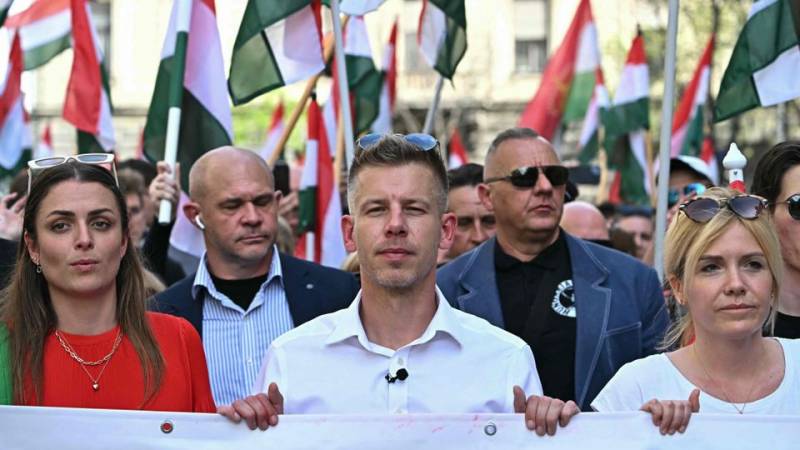
Nearly a hundred thousand Hungarians took to the streets in Budapest to protest Viktor Orban’s Fidesz government on April 6, in what was one of the largest demonstrations of discontent in the Eastern European EU nation in recent years.
The protests are being led by Peter Magyar, a 43-year-old lawyer and former diplomat, who was part of the Fidesz party leadership until earlier this year. After breaking rank from the ruling party in February, Magyar has sought to challenge Orban’s hold on power.
Magyar has criticized the Orban government for running the country like a “mafia” on behalf of oligarchs, and for running a centralized propaganda machine. In a speech during the protests on Saturday, Magyar exclaimed that “nothing will be as it’s been… change has started, which can’t be stopped.”
"Our elected leaders have incited the Hungarian people against each other for the past 20 years. Whether the fate of our country went well or we were close to bankruptcy, we were pitted against each other instead of allowing us to band together. We will put an end to this now," Magyar said.
Orban’s government is still reeling from the resignation of President Katalin Novak, who stepped down in February after protests broke out over news that she had pardoned a man who was convicted in a sexual abuse scandal at a children’s home in Bicske. Judit Varga, who is Magyar’s ex-wife, and served as the justice minister at the time of the pardon, also stepped down from her role.
Who is Viktor Orban?
Viktor Orban, Hungary’s Prime Minister, is the 27-member European Union’s longest ruling leader. Since assuming power in 2010, Orban has presided over the gradual erosion and backsliding of democratic norms in Hungary, turning the country towards the right, into what the European Parliament describes as a “hybrid regime of electoral autocracy.” Orban has often been at loggerheads with the EU, forging a nationalist path that has seen him cozy up to both Putin’s Russia and Xi Jinping’s China.
Orban, an ardent footballer, was the EU’s youngest prime minister at only 35 years, when he first led Fidesz to electoral victory. He also presided over Hungary’s ascension to NATO membership in 1999. The electoral defeats his party suffered in 2002 and then 2006 transformed his political beliefs, which took a sharp turn towards the right.
Orban’s brand of populist and nationalist conservatism is centered around fomenting hysteria around migration and challenging the European Union. At the EU, Orban is often seen as a pariah and accused of blackmailing the union over key decisions. The divide between Orban and the EU has grown wider recently over Russia’s war in Ukraine. Orban is seen as Putin’s only ally in the EU, and has protested Ukraine’s candidacy for EU membership. As recently as December 2023, Orban voted to block a €50 billion EU aid package to Ukraine.
How has Orban managed to turn Hungary into a hybrid regime?
Since 2010, Orban and his party Fidesz have carefully choreographed Hungary’s illiberal turn by systematically weakening the country’s justice system and changing the rules of the electoral system to entrench themselves and consolidate power. The extent of the electoral system’s rigging can be observed by the fact that Fidesz won two-thirds of the seats in the parliamentary elections in both 2014 and 2018, despite receiving less than 50% of the votes. Fidesz’s access to state resources also skewed the playing field to hand the party a massive advantage in both elections.
Orban and his party have also managed to intimidate and strongarm the country’s media into compliance by changing media regulations to suit their interests, which now permit the government to cancel media licenses and fine journalists without cause. These coercive tactics have worked to surprising effect, with independent media resorting to self-censorship, and most media houses being sold to oligarchs allied to Fidesz and its networks of patronage.
What is Magyar’s future?
Observers expect Magyar to form a new political party to challenge Orban and Fidesz’s 14-year grip on power, and to contest elections for the European Parliament in June.
The Orban government has dismissed Magyar as a political opportunist, portraying him as bitter after his divorce from Orban ally and former justice minister Judit Varga, and the loss of his positions in state owned companies. In March, Magyar released a recording of a conversation between himself and Varga, where she is speaking about government attempts to interfere with judicial proceedings in a corruption case against Fidesz leader Pal Volner.
